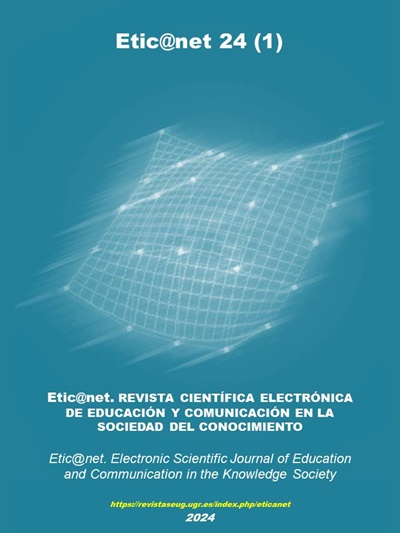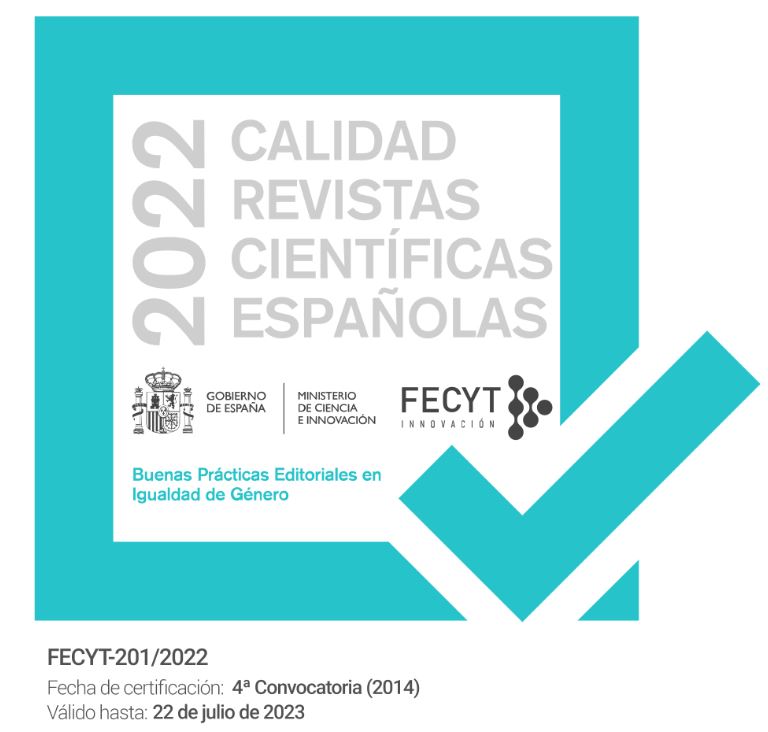Authentic leadership as Cohesion Method for the students with Dysphemia
DOI:
https://doi.org/10.30827/eticanet.v24i1.30187Keywords:
Dysphemia, Leadership, Authentic Leadership, ALQ, Aronson's PuzzleAbstract
Dysphemia or stuttering is a speech disorder in which a person blocks words by repeating a vowel or inability to pronounce. Students with dysphemia are under great social pressure and therefore their leadership skills may be inhibited from developing to their full capacity. Working on self-esteem in addition to speech therapy work is essential in order to provide these pupils with the tools they need. Therefore, working on authentic leadership based on social values that promotes emotional intelligence promotes the integration of all people with different problems or differences in heterogeneous groups is a reality. For this purpose, authentic leadership will be assessed through the Authentic Leadership Questionnaire (ALQ) and the Aronson Puzzle Technique (ATP) will be used to develop these skills.
Downloads
References
Abadal, E. (2012). Retos de las revistas en acceso abierto: cantidad, calidad y sostenibilidad económica. Disponible en: http://www.upf.edu/hipertextnet/numero-10/retos-revistas-en-acceso-abierto.html. [Consulta 2015, Agosto 15].
García, J. (2008). El profesor de educación superior frente a las demandas de los nuevos debates educativos. En Perfiles Educativos, vol. 27, núm. 108, pp. 9-30.
Allen, S. y Gilbert, P. (1995): A social comparison scale: Psychometric and relationship to psychopathology. Personality and Individual Differences, 19, 293-299.
Aronson, E. y Patnoe, S. (1997) The Jigsaw Clasroom. Building Cooperation in the Classroom, New York, Longman.
Avolio, B.J., Gardner, W.L., Walumbwa, F.O., Luthans, F. y May, D.R. (2004). Unlocking the mask: A cool at the process by which authentic leaders impact follower attitudes and behaviors. The Leadership Quarterly, 15(6), 801-823.
Biddle, B.J. y Anderson, D.S. (1989) Teoría, métodos, conocimiento e investigación sobre la enseñanza. En Wittrock, M.C. La investigación de la enseñanza, I. Enfoques, teorías y métodos . Barcelona: Paidós Educador.
Bisquerra, R. (2006). Modelos de Orientación e intervención Psicopedagógica. Barcelona: Praxis
Capdevila, A., Bellmunt, H. y Hernando, C. (2015). Estilo de vida y rendimiento académico en adolescente: comparación entre deportistas y no-deportistas. Retos. Nuevas tendencias en educación física, deporte y recreación, 27, pp. 28-33.
Caza, A., Bagozzi, R.P., Woolley, L., Levy, L. y Caza, B.B. (2010). Psychological capital and authentic leadership: Measurement, gender and cultural extension. Asia-Pacific Journal of Business Administration, 2, 53-70.
Cervera, J.F. y Ygual, A. (2002). Intervención educativa en los niños tartamudos: retos técnicos y compromiso ético para los especialistas en audición y lenguaje. Edetania, estudios y propuestas de educación, 9-35.
Daniels, D.E. y Gabel, R.M. (2004): The impact of stuttering on identity construction. Topics in Language Disorders, 24, 200-215.
Daniels, D.E., Hagstrom, F. y Gabel, R.M. (2006): A qualitative study of how African American men who stutter attribute meaning to identity and life choices. Journal of Fluency Disorders, 31, 200-215.
Elliott, J. (1989) Mejorar la calidad de la enseñanza mediante la investigación en la acción, en AA.VV. Investigación/Acción en el aula (Valencia, Consellería de Cultura, Educació i Ciència de la Generalitat Valenciana, 2.a ed.).
Garaigordobil, M., y Pérez, J. I. (2007). Autoconcepto, autoestima y síntomas psicopatológicos en personas con y sin disfemia: Un análisis descriptivo y comparativo. International Journal of Psychology and Psychological Therapy, 7(2)
García, C., Molero, F., Moya, M. y Mariano, J.A. (2015). Authentic leadership, group cohesion and group identification in security and emergency teams. Psicotherma, 27(1), pp. 59-64.
Klompas, M. y Ross, E. (2004): Life experiences of people who stutter, and the perceived impact of stuttering on quality of life: Personal accounts of South African individuals. Journal of Fluency Disorders, 29, 275-305.
Liu Y., Shi, W., Ding, B, Lix, X., Xiaio, K. y Wang, X. (2001): Anañysis of correlates in the SAS, the SDS, and the MMPI of stutterers. Chinese Journal of Clinical Psychology, 9, 133-134.
Ludlow, C. L. (2000). Stuttering: dysfunction in a complex and dynamic system. Editorial.
Luthans, F. y Avolio, B.J. (2003). Authentic leadership: A positive development approach. En Cameron, K.S., Dutton, J.E. y Quinn, R.E. (Eds.) Positive organizational scholarship: Foundations of a new discipline (pp.241-261). San Francisco Berret- Koehler.
Manaut, E. (2005): Tartamudez del desarrollo y tartamudez adquirida: semejanzas y diferencias. Revista de neurología, 40 (10), 587-594.
Moreno, J.A., Cervelló, Huéscar, E. y Llamas, L. (2011) Relación de los motivos de práctica deportiva en adolescentes con la percepción de competencia, imagen corporal y hábitos saludables, Cultura y Educación, 23 (4), 533-542.
Moriano, J.A., Molero, F. y Lév, J.P. (2011). Liderazgo auténtico. Concepto y validación del cuestionario ALQ en España. Psicothema, 23 (2), pp. 336-341.
Murphy, B. (1999): A preliminary look at shame, guilt and stuttering. Stuttering research and practice: Bridging the gap, 131-143.
Rodríguez, A. (2002): Metodología de la investigación en tartamudez. Revista de Logopedia, foliaría y audiología, 22 (4), 203-218.
Seligman, M.E.P. y Csikszentmihalyi, M. (2000). Positive psychology. American Psychologist, 55(1), 5-14.
Shamir, B y Eilam, G. (2005). What´s your story? A life -stories approach to authentic leadership development. The Leadership Quarterly, 16(3), 395-417.
Spring Professional. (2018). XIII Informe Los + Buscados de Spring Professional 2018. Madrid: The Adecco Group.
Ovejero, A. (1990). Aprendizaje cooperativo: Una alternativa eficaz a la enseñanza tradicional Barcelona: PPU.
Valero, M. y Vaquerizo B. (2009): “Puzzles mejorados con mapas conceptuales”, XV JENUI, Barcelona
Van Riper, C. (1982). The nature of stuttering. Pretice Hall.
Walumbwa, F., Avolio B, Gardner W, Werning TS, Peterson SJ. (2008). Authentic leadership: development and validation of a theory-based measure validation of a theory-based measure. Journal of Management, 34 (1): 89-126.
Downloads
Published
Issue
Section
License
The authors who publish in this journal agree to the following terms: The authors retain the copyright and grant the journal the right to be the first publication of the work as well as licensed under a Creative Commons Attribution License that allows others to share the work with an acknowledgment of the authorship of the work and the initial publication in this magazine. Authors are allowed and encouraged to disseminate their work electronically (for example, in institutional repositories or on their own website) before and during the submission process, as it may lead to productive exchanges as well as further citation. Earliest and greatest of published works (See The Effect of Open Access).













